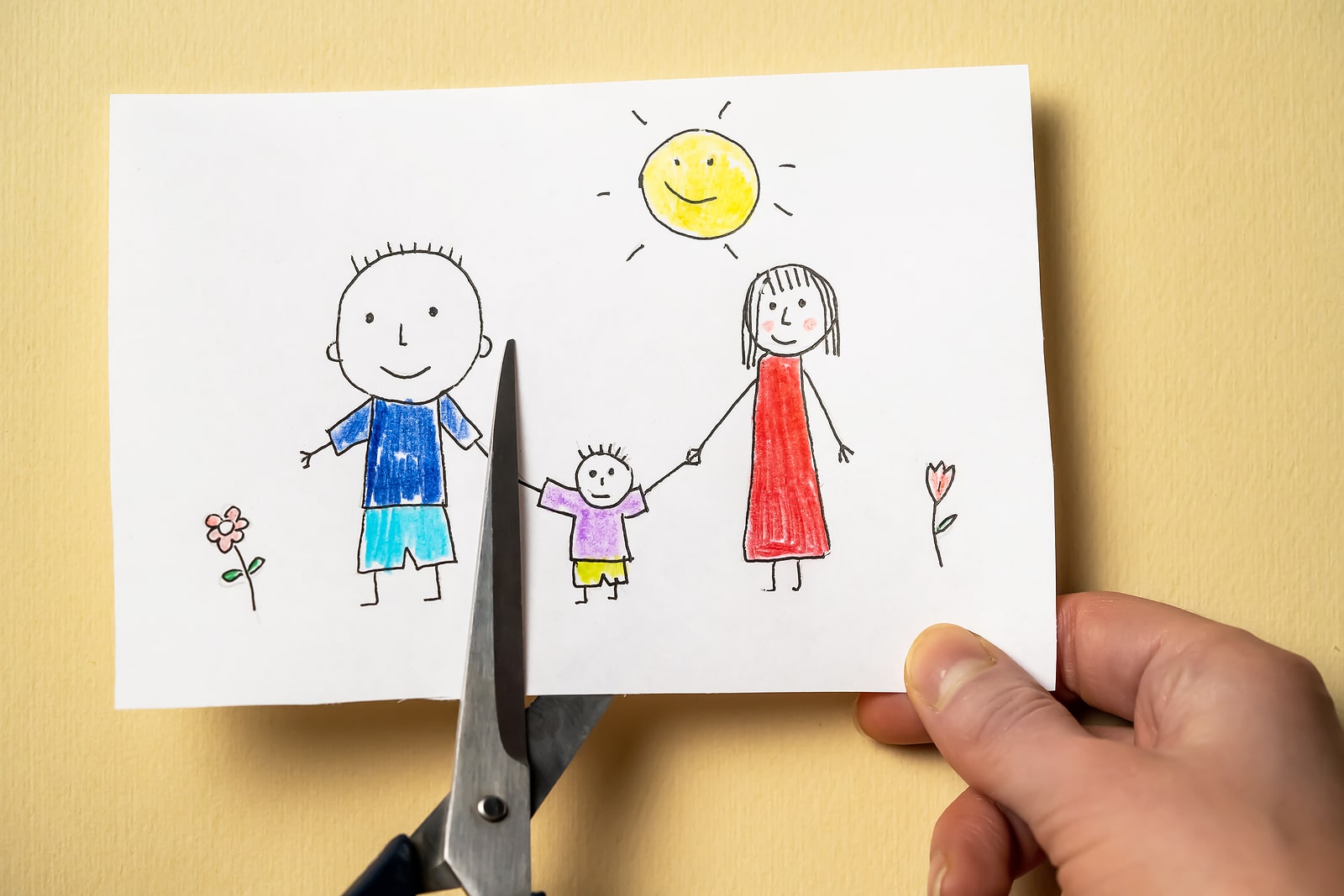Divorce is a life-altering event for any family, often bringing with it a whirlwind of emotions and challenges. For children, the dissolution of their parents’ marriage can be particularly destabilizing, leading to feelings of confusion, anger, sadness, and anxiety. When a child has Attention Deficit Hyperactivity Disorder (ADHD), the emotional impact of divorce can be even more profound. ADHD affects a child’s ability to regulate emotions, adapt to change, and manage stress, making the transition to a new family dynamic especially challenging. Understanding these unique challenges and implementing strategies to support your child can significantly affect their ability to cope during this difficult time.
In this article, we’ll explore the emotional toll that divorce can take on children with ADHD and provide parents with practical strategies to help their children navigate this challenging period. We’ll discuss the importance of maintaining routine and stability, effective communication techniques, the benefits of seeking professional help, and ways to ensure your child receives the necessary educational support. By taking a proactive approach, parents can help their children with ADHD adjust to the new reality in a healthy and constructive way.
Understanding ADHD and Its Impact on Emotions
Attention Deficit Hyperactivity Disorder (ADHD) is a neurodevelopmental disorder characterized by difficulties with attention, impulsivity, and hyperactivity. These symptoms can manifest in various ways, including difficulty focusing, forgetfulness, impulsive behavior, and restlessness. However, one of the lesser-known aspects of ADHD is its impact on emotional regulation. Children with ADHD often experience intense emotions and may struggle to manage these feelings effectively.
Emotional dysregulation is a common symptom of ADHD, leading to heightened emotional responses to everyday situations. A child with ADHD might react with extreme anger to a minor frustration or become overly anxious in response to a routine change. This difficulty in managing emotions can make the stress of divorce particularly overwhelming. The feelings of loss, uncertainty, and instability that come with divorce can exacerbate the symptoms of ADHD, leading to increased anxiety, depression, and behavioral issues.
During a divorce, children with ADHD may find it difficult to process the changes in their family structure. They might struggle to understand why their parents are separating and feel a sense of confusion or guilt, believing they are somehow responsible for the situation. These intense emotions can lead to behavioral outbursts, withdrawal, or regression in areas such as school performance or social interactions.
The Unique Challenges of Divorce for Children with ADHD
Divorce presents unique challenges for all children, but for those with ADHD, the experience can be particularly taxing. Children with ADHD often have difficulty adjusting to change, and the significant upheaval that comes with divorce can be overwhelming. The loss of a familiar routine, the absence of one parent from the household, and the potential changes in living arrangements can all contribute to increased stress and anxiety.
One of the most significant challenges for children with ADHD during a divorce is maintaining emotional stability. ADHD can make it difficult for children to regulate their emotions, leading to mood swings, irritability, and heightened sensitivity to stress. The emotional rollercoaster that often accompanies divorce can trigger these symptoms, making it harder for children to cope with the situation.
Furthermore, children with ADHD may have difficulty understanding and processing the reasons behind the divorce. They might misinterpret the situation, feeling they are to blame or need to take sides between their parents. This can lead to feelings of guilt, loyalty conflicts, and a deep sense of insecurity. The lack of a clear and consistent explanation from both parents can exacerbate these feelings, making it even more challenging for the child to come to terms with the new family dynamic.
It’s essential for parents to recognize that their child’s behavior during a divorce is not just a reaction to the situation but may also be influenced by their ADHD. For instance, a child might become more defiant or oppositional, not out of spite, but because they are struggling to cope with the overwhelming emotions they are experiencing. Understanding this can help parents respond with empathy and provide the appropriate support their child needs.
The Role of Routine and Stability
Routine and stability are crucial for all children, but they are especially important for those with ADHD. A predictable routine helps children with ADHD feel secure and reduces their anxiety by providing structure in their daily lives. During a divorce, when so many aspects of a child’s life are changing, maintaining as much of their routine as possible can provide a sense of normalcy and comfort.
Here are some strategies to help maintain routine and stability during a divorce:
- Consistent Schedules Across Households: If the child is splitting time between two homes, both parents should work together to create consistent schedules for meals, bedtimes, and activities. This consistency helps the child know what to expect and reduces the stress of transitioning between households.
- Regular Communication Between Parents: Parents should communicate regularly about the child’s needs and any changes in routine. This ensures that both parents are on the same page and can provide a unified approach to parenting.
- Clear Expectations and Rules: Maintaining clear expectations and rules across both households can help the child feel more secure. Consistent discipline and expectations reduce confusion and help the child understand what is expected of them, regardless of where they are.
- Emphasize Continuity in School and Activities: Keeping the child in the same school and continuing with their usual extracurricular activities can provide a sense of continuity and stability. These familiar environments and routines can be a source of comfort during the transition.
Stability in routine not only helps manage the symptoms of ADHD but also provides a foundation for the child to process the emotional aspects of the divorce. By maintaining as much normalcy as possible, parents can help their child navigate the changes in their family structure with greater ease.
Effective Communication Strategies
Communication is key to helping children with ADHD understand and cope with the changes brought about by divorce. Children with ADHD may have difficulty processing information, especially when it involves complex or emotional topics. Therefore, it’s important for parents to communicate clearly, consistently, and compassionately.
Here are some strategies for effective communication during a divorce:
- Be Honest and Age-Appropriate: It’s important to be honest with your child about the divorce, but the explanation should be age-appropriate. Avoid giving too many details or placing blame. Instead, provide a simple explanation that the child can understand, such as “Mom and Dad have decided to live in different homes, but we both still love you very much.”
- Reassure Your Child: Children with ADHD may be more prone to feelings of insecurity and anxiety. Reassure your child that the divorce is not their fault and that both parents will continue to love and care for them. Reassurance can help reduce feelings of guilt and anxiety.
- Encourage Open Dialogue: Create an environment where your child feels comfortable expressing their feelings and asking questions. Encourage them to share their thoughts and emotions, and listen without judgment. This open dialogue helps the child process their emotions and feel heard.
- Use Visual Aids and Clear Language: Children with ADHD often benefit from visual aids and clear, concrete language. Use visual schedules, charts, or drawings to help explain the new living arrangements or routines. Clear language and visual support can make the information more accessible and less overwhelming.
- Avoid Negative Talk About the Other Parent: It’s important to avoid speaking negatively about the other parent in front of the child. Negative talk can create confusion, loyalty conflicts, and additional stress for the child. Focus on providing a positive and supportive environment.
Effective communication helps children with ADHD feel more secure and supported during a divorce. It provides them with the information they need to understand the changes in their family and helps them feel more in control of the situation.
Seeking Professional Help
Divorce is a complex and emotionally charged process, and children with ADHD may benefit from professional support to help them navigate the challenges. Therapy or counseling can provide a safe space for the child to express their emotions, learn coping strategies, and receive guidance tailored to their needs. Support groups for children or parents going through a divorce can provide additional emotional support and a sense of community. These groups offer a space to share experiences, gain advice, and connect with others who are going through similar situations.
Here are some types of professional help that may be beneficial:
- Individual Therapy for the Child: A therapist who specializes in ADHD and child psychology can work with your child to address their specific emotional and behavioral challenges. Therapy can help the child develop coping strategies, improve emotional regulation, and process their feelings about the divorce.
- Family Therapy: Family therapy can be a valuable resource for families going through a divorce. It provides a space for parents and children to communicate openly, resolve conflicts, and work together to create a supportive environment. Family therapy can also help parents understand how to best support their child with ADHD during the divorce.
- Co-Parenting Counseling: Co-parenting counseling can help parents develop a cooperative and effective co-parenting relationship. This type of counseling focuses on communication, conflict resolution, and creating a consistent approach to parenting across both households.
- Support Groups: Support groups for children or parents going through a divorce can provide additional emotional support and a sense of community. These groups offer a space to share experiences, gain advice, and connect with others who are going through similar situations.
Seeking professional help can provide valuable tools and resources for both parents and children during a divorce. It ensures that the child’s emotional and behavioral needs are addressed and that the family has the support they need to navigate the challenges ahead.
Educational Support During Divorce
The stress of divorce can have a significant impact on a child’s academic performance, particularly for children with ADHD. The emotional upheaval, changes in routine, and potential behavioral issues can all contribute to difficulties in school. It’s important for parents to take proactive steps to ensure that their child continues to receive the support they need in their educational environment.
Here are some strategies to support your child’s education during a divorce:
- Communicate with Teachers and School Counselors: Keep your child’s teachers and school counselors informed about the divorce and how it may be affecting your child. They can provide additional support, monitor your child’s behavior and academic performance, and offer accommodations if needed.
- Request Educational Accommodations: If your child is struggling academically due to the divorce, consider requesting educational accommodations, such as extended time on tests, breaks during the school day, or access to a quiet space for studying. These accommodations can help your child manage their ADHD symptoms and reduce stress.
- Maintain Consistent Study Habits: Encourage your child to maintain consistent study habits and homework routines, even during the transition. Providing a quiet, distraction-free space for studying can help your child focus and succeed academically.
- Monitor Academic Performance: Keep a close eye on your child’s academic performance and be proactive in addressing any issues that arise. Regular communication with teachers can help you identify and address problems early on.
- Provide Emotional Support for School Challenges: Be supportive and understanding if your child is struggling in school. Recognize that academic difficulties may be a symptom of the emotional stress they are experiencing. Offer encouragement and help them develop strategies to overcome challenges.
Educational support is essential for helping children with ADHD succeed during a divorce. By working closely with educators and providing a stable and supportive environment at home, parents can help their child continue to thrive academically despite the challenges of divorce.
Conclusion
Divorce is a challenging experience for any child, but for children with ADHD, the emotional toll can be particularly heavy. The instability, changes, and emotional stress associated with divorce can exacerbate the symptoms of ADHD, making it difficult for children to cope. However, with the right strategies and support, parents can help their child navigate this difficult time and emerge stronger on the other side.
By maintaining routine and stability, communicating effectively, seeking professional help, and ensuring educational support, parents can provide the foundation their child needs to process the emotional aspects of divorce and adjust to the new family dynamic. Remember, your child’s emotional well-being is the most important priority during this time. With love, patience, and understanding, you can help your child with ADHD successfully navigate the challenges of divorce and continue to thrive.




